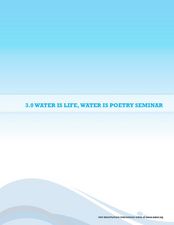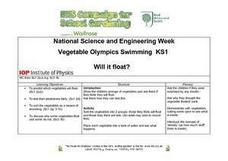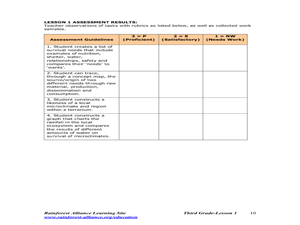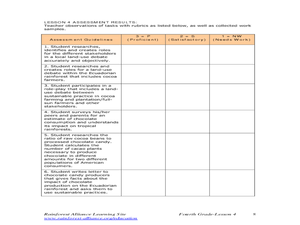Curated OER
Presenting Powerful Outlines for Science Fair Reports
Students examine and reflect on the role of science reports in the larger scientific community and become familiar with one scientist's experience preparing a report. They identify key points to build a strong science report and create a...
Critical Thinking Cooperative
Doing Our Share
Whether at home or in the classroom, each member of a community has certain responsibilities they must tend to. With the help of the children's story Piggybook by Anthony Browne, kids learn how to assign jobs in a fair and safe...
Curated OER
A County Fair Can Lead to an Exploration of Math, Science, and Literature
A county fair can provide an educational experience for students.
K12 Reader
Step by Step Instructions
Here's a worksheet that not only provides readers with information about crafting step-by-step directions for a science project, but also serves as a reading comprehension exercise.
Curated OER
Money Makes the Fair-Go-Round
Students explore the value of money. In this money lesson, students investigating combining amounts of money and making change. Students count sets of money and make fair trades. Resources are provided.
Curated OER
Flight Dreams - Folding into Flight
Combine measurement, following directions, physics, and art with one fun activity. Learners read a set of instruction to create three different kinds of paper airplanes. They measure, fold, and fly the planes, and record data and answer...
Curated OER
A Trip To the Animal Fair
Students share their experiences they have had with animals. Using photographs of their own pets, they create a booklet out of construction paper in which they identify the pets needs. They also compare and contrast what they need to...
Curated OER
Now you see it....Now you Don't
Students investigate the biodegrading process of packing peanuts. In this biological process lesson, students conduct an experiment to see how quickly packing peanuts biodegrade. Students check the process each day and record their results.
World Intellectual Property Organization
Learn from the Past, Create the Future: Inventions and Patents
3D printers, selfie sticks, smart watches. GPS, self-driving cars, YouTube. Imagine life without inventions. Believe it or not, these items were all invented in the last 10 years. Inventions, and the inventors responsible for them,...
Council for the Curriculum, Examinations and Assessment
Victorian Historians
Take the class back in time to the Victorian Era! The resource provides a plethora of activities that create experiences for scholars in class. Some activities include a fun fair, viewing the starry-night painting, and even experiencing...
Curated OER
A Seashell Lesson: Writing for Detail and the Scientific Process
Practice descriptive language in this lesson, which prompts elementary and middle schoolers to write detailed descriptive sentences describing a seashell. They write a description of a shell, create an illustration, and other students...
Curated OER
Water is Life, Water is Poetry Seminar
Students participate in a discussion about water and create water-inspired poetry. In this poetry instructional activity, students demonstrate a memorable experience involving water by constructing a poem.
Curated OER
Vegetable Olympic Swimming: Will it Float?
Students inspect nutrition by conducting a science experiment in class. In this vegetable identification lesson, students examine a group of different veggies and predict whether they will sink or float in a tub of water. Students check...
Curated OER
Smoothing Out the Rough Spots
Fifth graders experiment to observe the changes created on a surface by mechanical action of water with varying amounts of mineral content and abrasive qualities. They write the predictions of their outcomes and describe all of their...
Curated OER
What Boat Designs Float the Best?
Fifth graders investigate buoyancy by conducting a science experiment. In this water properties lesson, 5th graders predict which of their different paper boat designs will float for the longest period. Students conduct the...
Curated OER
How Sweat Glands Cool Your Body
Students use water and rubbing alcohol to explain how sweat cools mammals' bodies. They write their findings in a journal. After a lecture/demo, students perform a simple experiment that demonstrates this phenomenae.
Curated OER
A Valid Conclusion? Testing and Reporting on Hypotheses Using the Scientific Method
Students explore importance of accuracy in reporting, focusing particularly on articles documenting scientific discoveries, and practice scientific method by conducting experiments to test and report on scientific hypotheses.
Curated OER
Interdisciplinary Approach to Investigating Popcorn
Students conduct a lab experiment using the scientific method. In this interdisciplinary lesson plan, students will test the difference in popping white and yellow corn. Students will write their lab report in their science, math,...
Curated OER
Make A Rain Gauge
Students explore mathematics by participating in a nature measurement activity. In this rain lesson plan, students discuss the appropriate methods used in order to measure rain downpour. Students utilize a plastic bottle, tape,...
Curated OER
Introducing Microsoft Word
Students introduced to word processing by having them open a new document and use at least three to five commands within the program. Word processing commands are reinforced and practiced to gain more knowledge about entering and...
Curated OER
4-H Horticulture/Garden Activity Page
As part of an exploration of plants, learners engage in projects to design greenhouses, grow vegetables, and other endeavors. This 20 question activity packet could be used as a classroom mini-lesson or as the start to a long-term project.
Curated OER
Third Grade Ecuadorian Rainforest
Third graders explore the Ecuadorian Rainforest. In this writing and research lesson students utilize several information sources to learn about the Ecuadorian Rainforest. Students also summarize and paraphrase information learned...
Curated OER
How can we keep our forests intact and have chocolate too?
Fourth graders recognize the need to sustain crops in the rainforest. In this rainforest lesson, 4th graders consider the use of products from the rainforest. Students discuss how people of different points of view decide what...
Curated OER
Introduction to Scientific Theory
Ninth graders explain how scientists set up investigations. In this scientific process lesson, 9th graders review the principles of the scientific method and use these skills to answer an open-ended question about how to set up a...























